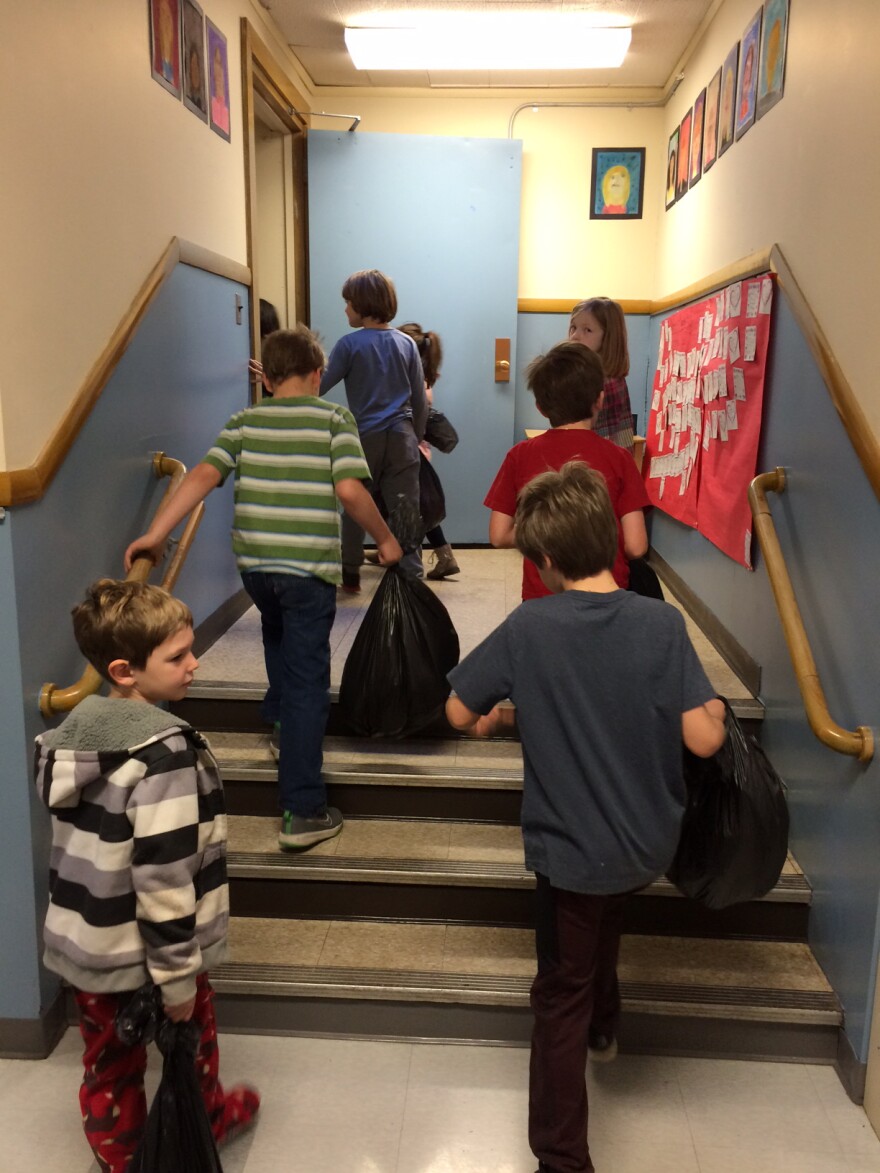At school, kids haul around all kinds of things — books, backpacks, band instruments and, at one Maine school, trash. This week at Peaks Island Elementary, students and staff carried their garbage to see just how much they generate in a week. It was a lesson that prompted the kids to close their noses, but open their eyes.
For five days now, a black plastic bag about the size of a pillow has been 10-year-old Bella Green’s constant companion.
“Bleh,” she says, “that smells bad.”
That’s because since 8:30 a.m. Monday, Green — like all students and staff at Peaks Island Elementary — has filled her bag with every last snack wrapper, paper towel and worksheet she’s used.
“Well, there’s stuff from lunch a few days ago, like really hard rice, and chicken,” Bella says.
And the kids have to carry their bags with them wherever they go at school — from art to P.E. and lunch.
The idea is for students to feel the weight of their waste — literally and figuratively.
“It feels sorta heavy,” says Otis McCanna, 8, adding that not only is his bag heavy — so is the stench.
He describes it as a unique potpourri of old broccoli and moist paper towels.
“Most of the other people’s trash smells really bad and it’s stinking up the classroom, so every morning I smell the fresh air while I can, and next thing you know I go in my classroom and it smells awful,” Otis says.
But the gross-out factor is actually good, says teacher Zoe Ryan-Humphrey, because it’s steering some kids toward different habits.
“What would normally go in the compost, they’re totally grossed out that they have to carry it around, which I think has been really helpful for them in terms of understanding wasting that food, ‘Well, I’ll just take that last bite of banana because otherwise it’s just going to rot in my bag,’” she says.
Kids are carrying their trash as part of a push at Peaks Island Elementary to incorporate more project-based learning. This project is called RRR-Evolution,with three R’s for reduce, reuse and recycle.

The school’s principal, Renee Serio, says it’s particularly important to think about trash on an island, where everything is carry in, carry out.
“On Peaks Island, we’ve learned that we generate 42,000 pounds of trash per week,” she says.
Over the course of the week, Serio says students have devised some creative strategies to minimize their waste.
“Like they were throwing their lunches down the toilet because they didn’t want to carry it, and they didn’t want to eat it,” she says. “So how do you negotiate this problem you’ve never had before?”
By the end of the week, it’s time for the kids to confront just how much waste they’ve accumulated at school. Standing on top of about a half-dozen tarps that line the gym floor, students first weigh their bags.
Some kids’ trash tips the scales at two or three pounds, others barely hit a quarter of a pound. After the weigh-in, it’s time to get gritty and dump and sort through the bags.
“I think this is worse than carrying it around the whole week,” says Rosie Clews, 10, thoroughly grossed out as she separates green beans and dried out rice from milk-soaked paper towels.
As she surveys other students’ trash, she says she’s surprised that some produced little more than orange peels over the course of the week. And it’s made her think about how she might alter some of her habits in the future.
“Eating more of my food probably, and probably reusing stuff more, like paper,” Rosie says. “Because normally if I mess up, I just throw it away. Like even if I just draw a tiny little thing, I’ll throw it away.”
Principal Renee Serio says she’s hoping the project will elicit changes large and small.
Next week, the school will resume its new composting program, which eliminates 60 pounds of waste a week. The kids will campaign to encourage islanders and tourists to reduce their waste. And, Serio says, she hopes that students will really think about what they toss into the trash.
“As young people on this planet, this will be one of their big problems,” she says. “And I want there to be a lot of thought about solutions to it.”



